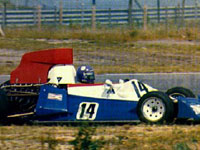Evidence of a downfall
Author
- Mattijs Diepraam
Date
- 8W March 1999 issue
Related articles
- Teddy Pilette - Third generation of a racing family, by Mattijs Diepraam/Leif Snellman/Felix Muelas/Eric Verkaaik
Who?Bob Evans What?BRM P201 Where?Zandvoort When?1975 Dutch GP |
 |
Why?
Bob Evans was a fairly talented British driver who reached F1 by making his name in F5000. These were the glory days of F5000, the F1-style open-wheel category running championships on both sides of the Atlantic. In 1973, Evans had already been a factor, driving an Alan McKechnie-run Lola T101 before taking the Rothmans European F5000 Championship in 1974. It was a T332 that gave Evans the breakthrough he desperately needed, having survived an F3 testing accident at Castle Combe just three years before.
The coveted F5000 title made Louis Stanley notice Bob. It secured the young Brit an F1 drive at BRM for 1975 - but with the lingering team losing its Motul backing it had to revert to entering a single sponsorless P201, an outdated Mike Pilbeam design Beltoise had not been able to get the work the year before - except for its debut race, scoring an unexpected second. Here, at the Dutch GP at Zandvoort, one and a half year later, Bob merely equalled his best qualifying position, a poor 20th he also managed at Zolder and was to repeat in his BRM farewell GP at Monza.
It all seemed over had it not been for Colin Chapman's soft spot for hard-working British blokes giving Evans a reprieve. Bob was signed on as a test driver, but with the 76 and its successor, the 77, so far proving hopeless, Evans had joined the legendary team at precisely the wrong time. Lotus was in the doldrums, Ickx having left in disappointment and Peterson and Andretti following suit after a disastrous Brazilian GP. Paired with young gun Gunnar Nilsson, Evans was thus given the opportunity to move to the race team. This time, however, he failed to impress, Andretti returning after just two races for Parnelli Jones, turning the difficult 77 into a winner by the end of the season. At the Race of Champions Evans also drove and was unlucky to lose fourth place after running out of fuel. A one-off at the British GP in one of RAM Racing's Brabhams was the last we saw of Bob Evans, in World Championship terms that is. The Englishman returned to an F1 cockpit on several more occasions. In 1977, he was picked to drive the Goldie Hexagon Penske in the Race of Champions, while in 1978 he contested the inaugural Aurora AFX championship in a Surtees.
Evans' departure from F1 coincided with the sorry demise of his former employer, BRM leaving F1 through the backdoor after its Rotary-backed P207 proved a complete failure at the hands of Teddy Pilette, the third and least talented generation of a famous Belgian racing dynasty. The embarrassing 1977 string of non-qualifications was in sharp contrast to the dominance BRM had shown in the early sixties, while remaining a race-winning outfit into the seventies. After Alfred Owen had sold out to sister Jean and brother-in-law Louis Stanley the team didn't seem on a decline at first, the BRM name still able to attract top drivers like Rodriguez, Siffert, Regazzoni or Beltoise. What must have been to his regret, the signing of rookie Bob Evans was the first clear evidence of BRM's imminent downfall.
